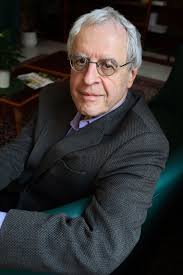
Like Tony Hoagland, Charles Simic is no one-trick pony. In addition to his prowess in poetry, he knows his way around an essay, too. While reading “Notes on Poetry and Philosophy,” I noted much of interest, both from Simic and from the poets and philosophers he quotes.
For instance, Wallace Stevens once said that the twentieth-century poet is “a metaphysician in the dark.” Simic, not so sure, compares this idea to chasing a black cat in a dark room. Not only is poetry on the loose in there, but theology and Western and Eastern Philosophies as well. So if you’re bumping heads a lot, don’t be surprised. And if there’s no cat to begin with, don’t be surprised by that, either. It may be the trickster Devil and not the cat that’s truly on the loose in the dark.
Surprisingly, Simic does not believe that poets know what they are going to write about in advance, simply sitting down to execute those ideas. He says, “My poems (in the beginning) are like a table on which one places interesting things one has found on one’s walks: a pebble, a rusty nail, a strangely shaped root, the corner of a torn photograph, etc.,… where after months of looking at them and thinking about them daily, certain surprising relationships, which hint at meanings, begin to appear.”
He then shares the pleasing (to poets familiar with rejections) anecdote of the time he wrote a series of poems about ordinary objects such as knives, spoons, and forks. The poems were summarily rejected by a poetry editor who wrote back asking why the young Simic wasted his time on such topics.
Simic was struck by how an “insider” like this editor might consider certain topics worthy and serious enough to write about and certain others not. In his own defense, he quoted Husserl: “Back to things themselves” (reminding me of William Carlos Williams’ famous words: “No ideas but in things”).
Added Simic: “An object is the irreducible itself, a convenient place to begin, it seemed to me. What appealed to me, too, was the discipline, the attention required, and the dialectics that went with it. You look and you don’t see. It’s so familiar that it is invisible, etc. I mean, anybody can tell when you’re faking it. Everybody is an expert when it comes to forks. Plus, all genuine poetry in my view is antipoetry.”
The gist of Simic’s philosophy on poetry comes after he quotes Jack Spicer: “Poets think they’re pitchers when they’re really catchers.”
Simic riffs on this idea: “Everything would be very simple if we could will our metaphors. We cannot.
“This is true of poems, too. We may start believing that we are recreating an experience, that we are making an attempt at mimesis, but then the language takes over,. Suddenly the words have a mind of their own.
“It’s like saying, ‘I wanted to go to church but the poem took me to the dog races.’
“When it first happened I was horrified. It took me years to admit that the poem is smarter than I am. Now I go where it wants to go.”
The basis of all this talk? Simic’s love of philosophy—Heidegger in particular. Old Heidegger said that poetry could not be understood until thinking itself was understood. “Then he says, most interestingly, that the nature of thinking is something other than thinking, something other than willing.
“It’s this ‘other’ that poetry sets traps for.”
That’s philosophy for you. Something is what it is not. In short, according to Simic, “The labor of poetry is finding ways through language to point to what cannot be put into words….
“Being cannot be represented and uttered—as poor realists foolishly believe—but only hinted at. Writing is always a rough translation from wordlessness into words.”
I don’t know about you, but I have to open my poetry file now so my poems can write me.
Should be nice for a change, don’t you think? Like having your car tugged slowly through an automatic car wash, only with words and sentences instead of suds and brushes….
